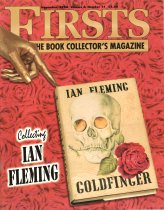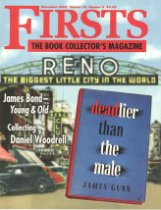

|
BOOKSELLER'S AUTHOR REPORT: Ian Fleming FULL NAME: Ian Lancaster Fleming PSEUDONYMS: Atticus BIRTH/DEATH: May 28, 1908 - August 12, 1964 WEBSITE: None 
BIOGRAPHICAL AND PUBLISHING NOTES:
Blofeld: I had heard that you were dead. And so goes the exchange between super-agent James Bond and super-villain Ernst Stavro Blofeld - a mid-century Holmes and Moriarty pairing that powered multiple books and films in Ian Fleming's James Bond canon. It could be said that Fleming himself lived twice, once as a WWII British Naval Intelligence Officer, the architect of both Operation Mincemeat and Operation Goldeneye, and once again, imaginatively, as James Bond himself, in 14 now-classic spy novels and story collections. Booksellers could make a case for a third Ian Fleming life - a remarkable run of nearly 50 years in which books, films and other media have been produced in mind boggling numbers in the wake of his final publication, Octopussy and the Living Daylights, in 1966, two years post mortem. And this life is seemingly eternal. There are patterns among authors, of course. Some writers flash brightly but briefly, some glow quietly at first and flame later, etc., but only a handful burst instantly into flame and burn hot for decades. To observe this pattern in mid-century formulaic fiction that celebrates, among other things, gratuitous violence, casual sexism and imperialistic (if not racially-inspired) superiority - and let's not forget Bond's uncomfortably Western addiction to "toys," among them spy gadgetry, fast cars and gorgeous women - at a level that some literati would regard with horror in the 21st century is perhaps all the more remarkable. But it's easy to forget, perhaps, the prevailing climate at mid-century. Fresh and raw out of a horrific global war in which heroes and villains weren't always so readily distinguished - and certainly not by groupings of allied or axis powers, which saw Cold War Russia morph from friend to enemy - there grew a longstanding appetite for incorruptibly white heroes who prevailed over incorrigibly black villains. None of that gray psychological ambiguity and complexity that defined the British spy novel leading up to James Bond for us, no, sir. Fleming kept it simple; simple was comforting; and along the way it was also great fun because he was, despite his reluctance to plumb depths, a brilliant writer. There's an interesting East-to-West time lag here as well: Bond didn't burst quite so instantly into flame in the US, as he had in the UK. We can pinpoint the ignition precisely at the 1961 publication of a Life Magazine interview with John F. Kennedy, in which the President confessed an enthusiasm for Fleming's books, naming From Russia, with Love as one of his top 10 favorites. The phenomenon suddenly went global. And lest we think that there was no pre-1961 counterpart to the Bond fix on this side of the pond, recall the TV Western. And today's climate? We're seeing some similarities. Ongoing war, which sometimes seems without end, not to mention focus; enemies who don't always look like enemies - or do, and live among us, masquerading as friends; and many other uncertainties, extending globally. The very same appetite for stories with clearly defined heroes and villains persists, and James Bond continues to slake it. Another factor fueling this fire - movies. Some books are difficult to make into films, some not, but every last one of Fleming's books, given plot simplicity and sharply defined elements of conflict, seem born to be made into movies; and indeed all of them have been - and nearly all have been wildly successful. The books feed the movies, the movies feed the books, etc., and the cycle seems far from its final turn. There's at least some fascination with Fleming's life - a life tragically shortened by excessive drinking and smoking, not to mention degraded by obsessive womanizing - but it's difficult to say whether or not it has fueled much additional interest his books. Maybe. What's intriguing is the incongruity of these patently undisciplined behaviors and the extraordinary discipline he exercised as a writer: Fleming returned to his Jamaican estate each year to write a next book, producing a few thousand words daily until completion. What we're left with, in turn, is a neat package of 14 Bond books published in 14 years. That the series ended so soon explains why collectors stray far beyond the acquisition of UK and US first editions into numerous reprintings, sets and other variants. It also explains why there are so many opportunities for booksellers. Oddly enough, there is no standard Fleming bibliography in book form, but much bibliographic information has been gathered over the years. Two sources are especially noteworthy. Heritage Bookshop manager Lee Biondi penned several articles and an exceptionally detailed bibliography of Bond UK and US firsts for Firsts Magazine's November 1998 issue. Biondi returned to update things in the November 2008 issue. Both may be purchased on the Firsts website. Additionally, the M16 website features a staggering abundance of Bond material, including issue points for UK firsts. One could spend weeks there, literally.
 
Fleming signatures are uncommon for several reasons. For one thing, the window of opportunity was small. While alive, Fleming published his first book, Casino Royale, in 1953 and his last, You Only Live Twice, in 1964 - the year of his death - a brief 11 years. (The Man with the Golden Gun and Octopussy were published posthumously.) Also, Fleming was a bibliophile - actually, a book collector of note who jointly founded and published The Book Collector, a mid-century antiquarian quarterly - and appreciated the value a personal inscription/signature could add to a book. Most extant signatures were done for friends and associates, therefore, and usually in UK editions. Additionally, he rarely signed title pages. Given the value of an authentic Fleming signature - $500 and up - it's likely that most FlatSigned examples that pop up without provenance, especially on title pages, are forgeries. >>>>> Article continues on next page >>>>>
Questions or comments?
| Forum
| Store
| Publications
| BookLinks
| BookSearch
| BookTopics
| Archives
| Advertise
| AboutUs
| ContactUs
| Search Site
| Site Map
| Google Site Map
Store - Specials
| BookHunt
| BookShelf
| Gold Edition & BookThink's Quarterly Market Report
| DomainsForSale
| BookThinker newsletter - free
Copyright 2003-2011 by BookThink LLC
|

|
|